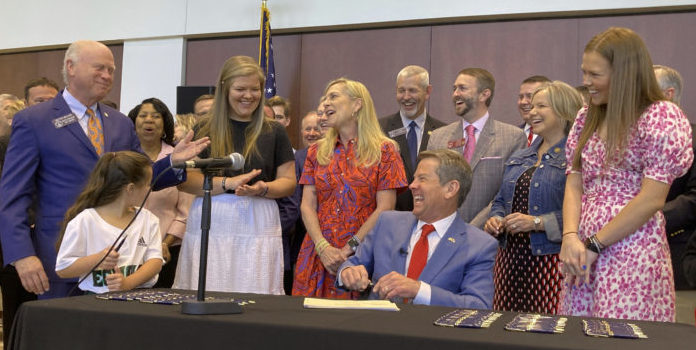(Headline USA) The main athletic association for Georgia high schools voted Wednesday to ban transgender boys and girls from playing on the school sports teams matching whatever gender they feel like on a particular game day, saying instead that students must play on teams that match the sex listed on their birth certificates at birth.
The Georgia High School Association’s executive committee, meeting in Thomaston, voted unanimously for the change. It will take effect for the next school year, spokesperson Steve Figueroa said.
Proponents of the ban say transgender girls have an unfair advantage because they were born as stronger males and warn that those born as girls could be denied places on the team or on the podium if playing against transgender girls.
“Everyone should have an opportunity to participate, but the field of play should be fair,” said Cole Muzio, president of the conservative Frontline Policy Council, which lobbied for the action. “GHSA’s action today recognizes science, reflects reality and restores fairness.”
Republican Gov. Brian Kemp, running for reelection, embraced a ban. When he signed a bill last week reiterating GHSA’s power to ban transgender athletes, Kemp said he wanted to “protect fairness in school sports.”
Opponents said excluding transgender children would send a harmful message to a group that’s already vulnerable to suicide or harming themselves.
“To these very vulnerable trans kids who do appear to have substantial mental health issues, they will receive this as a message of rejection,” said state Sen. Sally Harrell, an Atlanta Democrat and the mother of a transgender child.
At least 12 Republican-led states have passed laws banning transgender women or girls in sports. Other GOP-led states are considering such bans. Some other states, such as Texas, have banned transgender girls through athletic association policies, as Georgia did.
From 2016 until now, the Georgia association allowed individual schools and school boards to decide what teams transgender students could play on. The association includes public schools and some private schools. GHSA Executive Director Robin Hines said the change just reverts back to the birth certificate rule that existed “forever” before 2016.
“This is focusing on athletic equity and competitive balance,” Hines said.
It’s unclear if any transgender students were participating in sports, though. Proponents of a ban listed no specific examples. Hines said he’s been told that a few transgender athletes have run in boys cross-country, but said the association does not formally track the issue.
The spotlight swung to GHSA after Georgia lawmakers, unable to agree on a law banning transgender students from playing sports matching their gender identity, passed House Bill 1084 reiterating GHSA’s existing power to regulate the issue.
The last-minute deal was reached after Kemp prodded lawmakers to act on the final night of Georgia’s legislative session. The passage of the bill was so rushed that many lawmakers didn’t have copies of the text and didn’t know what they were voting on.
Opponents said they were surprised that the association acted Wednesday without study, pointing to language in the bill that had seemed to call for a study committee. They said they were open to some kind of regulation, but opposed an outright ban.
“Their actions, to move so hastily and without consideration of the harms that this will do, without actually researching the complexities and nuances of this issue, will ultimately hurt kids throughout Georgia,” said Jeff Graham, the executive director of Georgia Equality, a group that advocates for the gay, lesbian, bisexual and transgender community.
Graham suggested that some public school districts whose representatives voted for their policy were defying their own policies that are more welcoming to transgender students. Opponents also warned that a ban could violate Title IX of federal education law prohibiting sex discrimination, an executive order signed by Democrat President Joe Biden that prohibits discrimination based on gender identity in school sports and elsewhere, as well as rulings by federal courts.
Republican House Speaker David Ralston of Blue Ridge had blocked putting the ban in law, but agreed to the compromise. He told reporters moments after the bill passed that he didn’t want transgender children “targeted,” and planned to tell GHSA as much.
However, Ralston spokesperson Kaleb McMichen said Wednesday that the House Speaker hadn’t talked to the association about the subject.
“We don’t have a comment on GHSA’s decision — it was theirs to make,” McMichen said.
Adapted from reporting by the Associated Press

